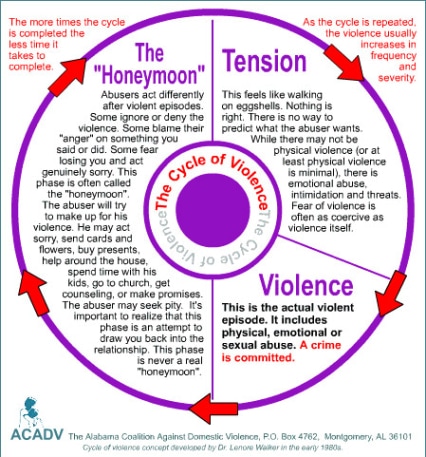
What is Abuse?
Domestic Violence
Why They Stay
Leaving an abusive relationship can be very difficult, and there are many reasons why a person may stay in an unhealthy relationship. Some of these reasons may include:
- Fear of what the abuser may do to them, children, pets, relatives, friends, etc. if they leave
- Low self-esteem from guilt, shame, name calling, insults, and the feeling that the abuse is the victim’s fault
- Lack of money, as victims are often forced to be financially dependent on the abuser
- Not wanting to break up their family or hurt their children
- Hoping to control the abuser’s behavior by “being perfect” or hoping that the abuser will change
- Religious beliefs
- Immigration status, as abusers may sabotage legalizing their victim’s status, or isolate the victim
- Pressure from family and friends who may not support or believe the victim
If you think someone you know is in an abusive relationship, there are ways you can help, including listening to and believing their story and being supportive. Make sure they know they are not alone, and that you will help them. Offer them information about abuse and agencies like Avalon that can assist them. Be sure to not be judgmental, don’t tell them what to do, and keep what they tell you confidential, unless they ask you to reach out on their behalf.
Domestic Violence
Domestic violence is an escalating pattern of abuse where one partner in an intimate relationship controls the other through force, intimidation, or the threat of violence. Domestic violence has no boundaries. It affects all ages, all sexual orientations, all cultures, all religions, all professions, and people from all income levels. Domestic violence often follows a typical pattern of behavior. Each phase may last for a different length of time. Over time, the phases may grow shorter and the overall level of violence may increase.

Physical Abuse
Physical abuse occurs when one person uses threats or physical force to intimidate, injure or endanger another person. There is a wide range of behaviors that fall into the category of physical abuse, including: pushing, hitting, kicking, grabbing, choking, throwing things, reckless driving, abandoning you in a dangerous place, and assault with a weapon.
Psychological Abuse
Psychological or emotional abuse can be verbal or nonverbal. These include: yelling, name-calling, blaming, and shaming, isolation, intimidation, and controlling. Emotional abuse can be just as damaging as physical abuse.
Financial Abuse
Financial abuse can take many forms including denying you access to funds, having you account for money spent, putting all bills in your name, demanding your paycheck, interfering with your work or not letting you work, and preventing you from using the car.








